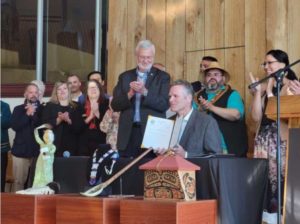 ANCHORAGE, AK – The Alaska Federation of Natives (AFN) hosted the signing of House Bill 123 – Providing for State Recognition of Tribes and Senate Bill 34 – State-Tribal Education Compact Schools, on Thursday, July 28, 2022, at the Alaska Native Heritage Center (ANHC). This event celebrated two historic pieces of legislation: the formal recognition of the status of Alaska Tribes (a step forward toward modernizing state policy toward Alaska Native Tribes), and the state government’s authority to compact with federally recognized tribes for the education of tribal children.
ANCHORAGE, AK – The Alaska Federation of Natives (AFN) hosted the signing of House Bill 123 – Providing for State Recognition of Tribes and Senate Bill 34 – State-Tribal Education Compact Schools, on Thursday, July 28, 2022, at the Alaska Native Heritage Center (ANHC). This event celebrated two historic pieces of legislation: the formal recognition of the status of Alaska Tribes (a step forward toward modernizing state policy toward Alaska Native Tribes), and the state government’s authority to compact with federally recognized tribes for the education of tribal children.
“The cultural survival of our Indigenous people is dependent on our ability to maintain our values, practice our traditions, and maintain freedom to live our lives well with dignity and respect for each other,” said Julie Kitka, President of the Alaska Federation of Natives. “We have strengthened our tribal governments and have initiated multiple efforts to continue our path to self-determination and self-governance. The formal recognition through this legislation is an historic step for us to have a successful relationship with the state.”
The statute does not impact the existing legal status of Alaska Tribes, nor does it change the state’s responsibility or authority. However, it does recognize Alaska’s Indigenous people. This recognition will help unify our tribal governments with the state government.
“Excited to see what our state can accomplish working together. This is one step to strengthening our relationships as sovereigns,” said ‘Wáahlaal Gíidaak Barbara Blake, Alaskans for Better Government.
Many tribes, tribal organizations, and Alaska Native Corporations formally submitted letters of support for this bill, introduced by Representative Tiffany Zulkosky of District 38. In her sponsor statement, Representative Zulkosky stated that this bill serves as a first step, formalizing in statute, that the State of Alaska will no longer deny Tribes’ existence.
“Today is a historic day for Alaska and one that is long overdue. While the inherent sovereignty of Alaska Tribes has been consistently affirmed in Federal policy, in rulings by the Supreme Court, and by Executive Order in 2018, the signing of House Bill 123 provides formal recognition in statute for the first time in our state’s history,” said Representative Zulkosky. “I hope today is looked back on as the beginning of a new chapter of collaboration and partnership between the State and Alaska’s Tribes.”
“I look forward to the innovation that this formalized government to government relationship will usher in for Alaska,” said La quen náay Liz Medicine Crow, Alaskans for Better Government.
Senator Gary Stevens sponsored SB34. In his sponsor statement, Senator Stevens stated that state-tribal compact schools will provide another avenue for addressing existing challenges and ensuring that children are prepared to be healthy, productive community members and to be positioned for success. “This is an historic opportunity to embrace our unique Alaska Native heritages, providing a means for local tribal governments to determine their own path for educating young Alaskans,” said Stevens. “I’m proud to have contributed to and be a part of this historic event.”
Julie Kitka has been a supporter of tribal educational compacting, and her efforts with AFN have been immeasurable. “We collectively want to maintain our language, culture, and traditional ways of life,” said Kitka. “Educational compacting is one way that we can improve education for our tribal children.”
Many Native leaders were in attendance, including Willie Hensley and Emil Notti. Emily Edenshaw, President and CEO of ANHC gave the opening remarks welcoming the distinguished guests to this historic event. “By signing these bills into law, we are practicing one of our most critical Alaska Native values: Taking Care of Others, You Cannot Live Without Them,” said Edenshaw. “Alaska Native values are not relics of the past – they walk with us and are with us today.”
Please email Ben Mallott at bmallott@nativefederation.org for more information.
###
